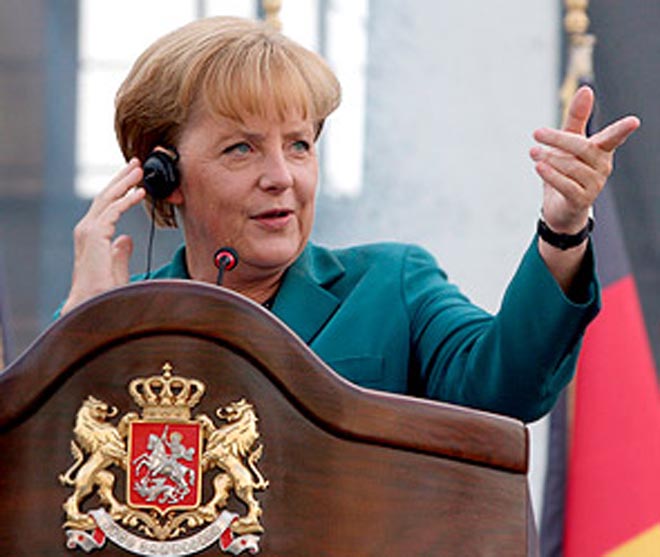German Chancellor Angela Merkel took centre stage at the European Union's summit on Thursday as she fought for, and won, a tough deal from eurozone states offering Greece a financial safety net in return for far-reaching concessions.
The buildup to the summit was marred by a row between Merkel and French President Nicolas Sarkozy over how tough a line to take with Greece. But in face-to-face talks with Sarkozy, Merkel pushed through a series of strict conditions that paved the way for reconciliation, dpa reported.
"Until this afternoon her line was, 'Niet, nein, non, no'. Then at last it was, 'Yes, but...'," a diplomat close to the talks said as news of the Franco-German deal broke.
Greek Premier George Papandreou asked for the promise of an emergency eurozone loan - as opposed to a loan itself - to reassure markets of his country's creditworthiness, and convince them to drop the interest rate of over 6 per cent they currently charge Athens.
The summit provided that guarantee, offering bilateral loans from eurozone states, combined with "substantial" funding from the International Monetary Fund (IMF), if Greece ever found itself unable to borrow on the money markets.
"We hope it will not have to be activated because the hope is that this will also reassure those who hold Greek securities: They will have confidence that the eurozone will never abandon Greece," said the president of the Council of EU member states, Herman Van Rompuy.
Van Rompuy chaired both the summit of the leaders of the 16 euro nations and the summit of all 27 EU leaders that approved the deal.
Greek leaders hope the deal will turn the page on the drama that began in October when Papandreou's new government revealed that its predecessor had massively misstated its budget deficit, spooking markets and sending the euro and the value of Greek bonds tumbling.
"The efforts of the Greek people have been rewarded. Today we have taken a decision not just for Greece but for the whole of Europe," Papandreou said. His government has passed two rounds of savage budget cuts since January to bring its finances back into order.
But the deal comes at a hefty price. That price was largely dictated by Merkel, whose coalition faces regional elections on May 9, and whose voters fiercely oppose any suggestion of using their tax money to rescue Greece from the consequences of its actions.
"Europe is a compromise," a weary-looking Sarkozy said after the meeting at a press conference that lacked his usual ebullience.
Greece will not get any money just by asking. First, the EU's executive, the European Commission, and the European Central Bank will have to propose such a move. Second, every single euro state will have to approve it.
"If necessary, members of the eurozone would provide financial support. Obviously, that would be subjected to very strict conditions," Van Rompuy said. Every member would chip in, he said.
Third, the IMF will have to be fully involved in the deal, with the right to impose strict fiscal conditions on the recipient.
The IMF will probably pay one third of any loan, euro states two thirds, the head of the committee of eurozone finance ministers, Jean-Claude Juncker, said.
The head of the European Central Bank, Jean-Claude Trichet, said that he was happy with the deal, rejecting earlier reports that had quoted him as saying that IMF involvement would be "very very bad."
Fourth, the loan would not "provide financing at average euro area interest rates, but ... set incentives to return to market financing as soon as possible" by being more expensive than market loans.
Fifth, and perhaps most explosively, the eurozone also called for tougher internal rules to make sure that no euro state ever again gets away with the kind of lax discipline that led to Greece's fall.
"Surveillance of economic and budgetary risks and the instruments for their prevention ... must be strengthened," the agreement says, calling for a "task force" to make concrete proposals to that effect by the end of the year.
That would give Berlin, if it wanted, the right not to just keep an ever closer eye on fiscal developments in Greece, but to extend its surveillance to other euro states with floundering finances such as Portugal, Spain, Ireland and Italy.
However, following objections from Britain, Ireland and the Netherlands, the summit dropped a call from Merkel and Sarkozy to turn future EU summits into "the economic government of the EU."
EU summits "must improve the economic governance of the EU," the final agreement read discreetly.
EU leaders had been scheduled to discuss long-term economic planning and climate change, but those debates were largely eclipsed.
Attention now turns to the question of whether money markets will endorse the deal. In May, it will turn to German voters.
Merkel makes her point as euro states agree to Greek plan
German Chancellor Angela Merkel took centre stage at the European Union's summit on Thursday as she fought for, and won, a tough deal from eurozone states offering Greece a financial safety net in return for far-reaching concessions.






